上海新世纪6BU2 英语写作教学活动设计案例一
- 格式:docx
- 大小:101.67 KB
- 文档页数:4
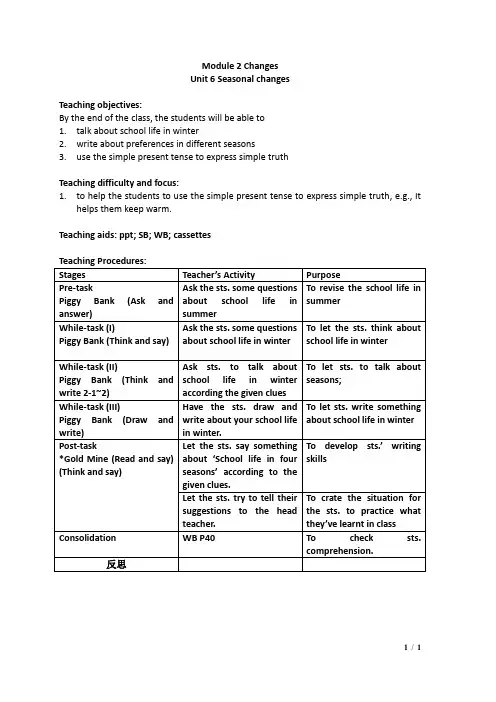
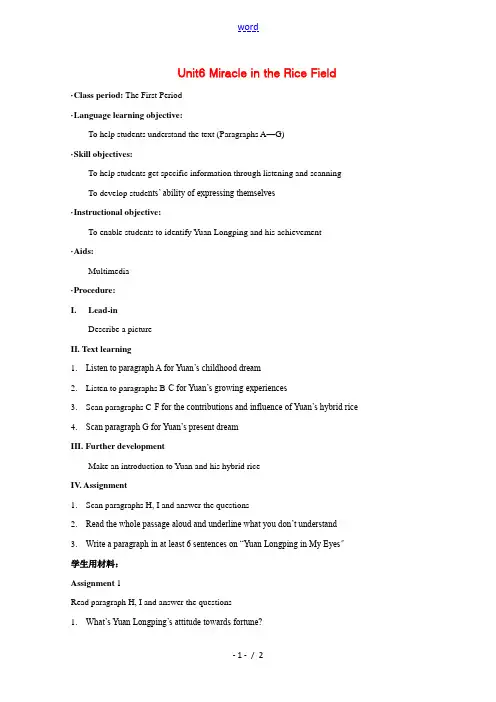
Unit6 Miracle in the Rice Field ·Class period: The First Period·Language learning objective:To help students understand the text (Paragraphs A—G)·Skill objectives:To help students get specific information through listening and scanningTo develop stude nts’ ability of expressing themselves·Instructional objective:To enable students to identify Yuan Longping and his achievement ·Aids:Multimedia·Procedure:I.Lead-inDescribe a pictureII. Text learning1.Listen to paragraph A for Yuan’s childhood dream2.Listen to paragraphs B-C for Yuan’s growing experiences3.Scan paragraphs C-F for the contributions and influence of Yuan’s hybrid rice4.Scan paragraph G for Yuan’s present dreamIII. Further developmentMake an introduction to Yuan and his hybrid riceIV. Assignment1.Scan paragraphs H, I and answer the questions2.Read the whole passage aloud and underline what you don’t understand3.Write a paragraph in at least 6 sentences on “Y uan Longping in My Eyes〞学生用材料:Assignment 1Read paragraph H, I and answer the questions1.What’s Yuan Longping’s attitude towards fortune?_________________________________________________________________2.Are Yuan’s hobbies special ones or just ordinary ones?_________________________________________________________________Assignment 3Wri te a paragraph of at least six sentences on “Yuan Longping in My Eyes〞1.Choose two adjectives in the box2.For each adjective, write at least 2 supporting sentences with information from the textYuan Longping in My Eyes_______________________________________________________________________________________________________________________________________________________________________________________________________________________________________________________________________________________________ ________________________________________________________________________________ ________________________________________________________________________________ ________________________________________________________________________________ ________________________________________________________________________________ ________________________________________________________________________________ ___。
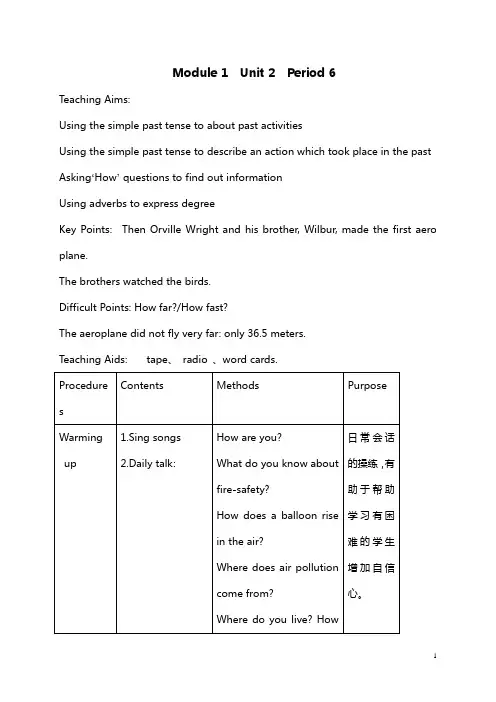
Module 1 Unit 2 Period 6Teaching Aims:Using the simple past tense to about past activitiesUsing the simple past tense to describe an action which took place in the past Asking‘How’ questions to find out informationUsing adverbs to express degreeKey Points: Then Orville Wright and his brother, Wilbur, made the first aero plane. The brothers watched the birds.Difficult Points: How far?/How fast?The aeroplane did not fly very far: only 36.5 meters.Teaching Aids: tape、radio 、word cards.Procedures Contents Methods PurposeWarming upPre-task 1.Sing songs2.Daily talk:How are you?What do you know aboutfire-safety?How does a balloon rise inthe air?Where does air pollutioncome from?Where do you live? How isthe air there?1. Ask the students to look日常会话的操练,有助于帮助学习有困难的学生增加自信心。
preparationLook and readnew words: metrekilometer per hour at the pictures on page 13.Ask: What is this? Is it oldor new? To elicit: It’s an aeroplane./ It’s an old aeroplane.Introduce: metres and kilometers per hour.2. Play the recording: lookand read. Students listenand follow in their books.由图片引出新课,让学生大致了解故事内容。
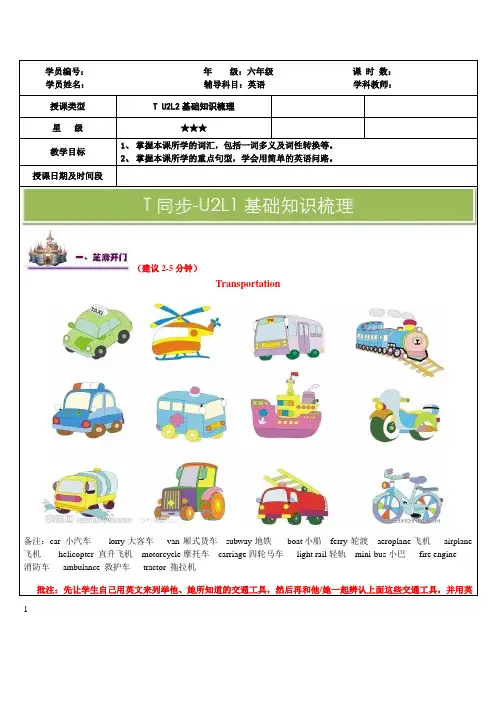
学员编号:年级:六年级课时数:学员姓名:辅导科目:英语学科教师:授课类型T U2L2基础知识梳理星级★★★教学目标1、掌握本课所学的词汇,包括一词多义及词性转换等。
2、掌握本课所学的重点句型,学会用简单的英语问路。
授课日期及时间段(建议2-5分钟)Transportation备注:car 小汽车lorry 大客车van 厢式货车subway 地铁boat小船ferry 轮渡aeroplane 飞机airplane 飞机helicopter 直升飞机motorcycle 摩托车carriage 四轮马车light rail 轻轨mini-bus 小巴fire engine消防车ambulance 救护车tractor 拖拉机批注:先让学生自己用英文来列举他、她所知道的交通工具,然后再和他/她一起辨认上面这些交通工具,并用英T同步-U2L1基础知识梳理1文标注出来。
(建议20-25分钟)一、词汇Words1. means n . 手段,方法;工具(单复数同形)e. g. ) The quickest means of travel is by plane. 最快的交通工具是飞机。
Homework should not be a means of controlling children.词组: means of transport批注:这里要注意和“way”进行区别,两者在表示方式时可以互换,但是means侧重指一种手段或者是完成某事的一种工具,而way侧重指做某事的一种方式,不能翻译成“工具”或“手段”。
2. coach n . 长途汽车,(火车) 客车车厢,教练(eg) The foreigner over there is the coach of the volleyball team.那边的外国人是这个排球队的教练。
We went to Paris by coach/on a coach. 我们乘长途汽车去的巴黎。
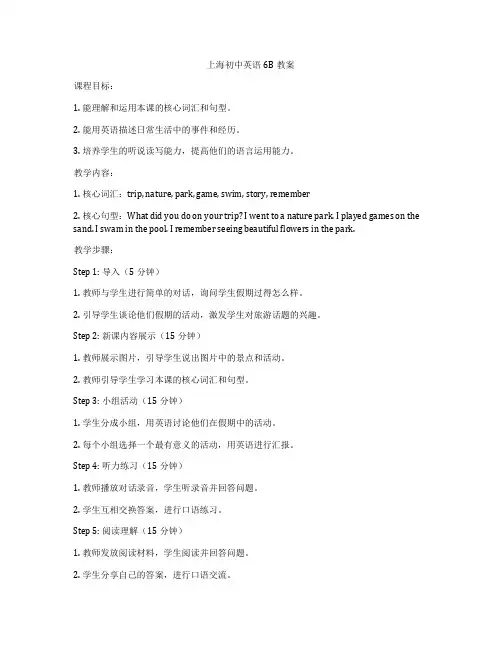
上海初中英语6B教案课程目标:1. 能理解和运用本课的核心词汇和句型。
2. 能用英语描述日常生活中的事件和经历。
3. 培养学生的听说读写能力,提高他们的语言运用能力。
教学内容:1. 核心词汇:trip, nature, park, game, swim, story, remember2. 核心句型:What did you do on your trip? I went to a nature park. I played games on the sand. I swam in the pool. I remember seeing beautiful flowers in the park.教学步骤:Step 1: 导入(5分钟)1. 教师与学生进行简单的对话,询问学生假期过得怎么样。
2. 引导学生谈论他们假期的活动,激发学生对旅游话题的兴趣。
Step 2: 新课内容展示(15分钟)1. 教师展示图片,引导学生说出图片中的景点和活动。
2. 教师引导学生学习本课的核心词汇和句型。
Step 3: 小组活动(15分钟)1. 学生分成小组,用英语讨论他们在假期中的活动。
2. 每个小组选择一个最有意义的活动,用英语进行汇报。
Step 4: 听力练习(15分钟)1. 教师播放对话录音,学生听录音并回答问题。
2. 学生互相交换答案,进行口语练习。
Step 5: 阅读理解(15分钟)1. 教师发放阅读材料,学生阅读并回答问题。
2. 学生分享自己的答案,进行口语交流。
Step 6: 写作练习(15分钟)1. 教师发放写作题目,学生按要求进行写作。
2. 学生互相交换作文,进行修改和评价。
Step 7: 总结与作业(5分钟)1. 教师对本节课的内容进行总结,强调重点词汇和句型。
2. 布置作业:用英语写一篇关于假期的作文。
教学评价:1. 课堂参与度:观察学生在课堂上的发言和互动情况,评价他们的参与度。
2. 语言运用能力:通过听力练习、口语交流和写作练习,评价学生的语言运用能力。
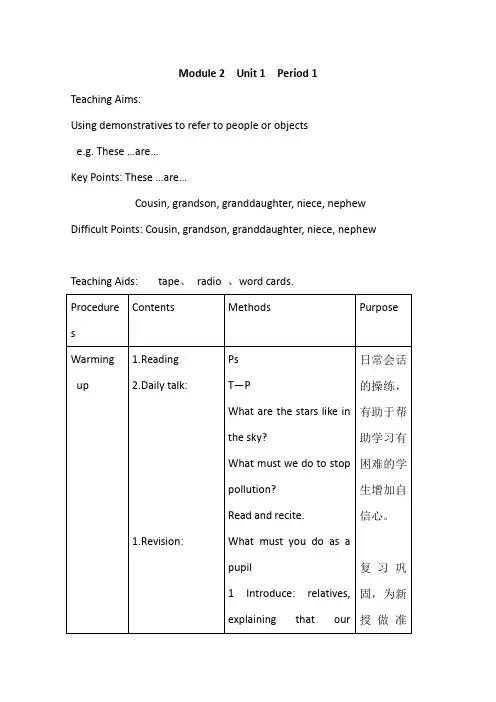
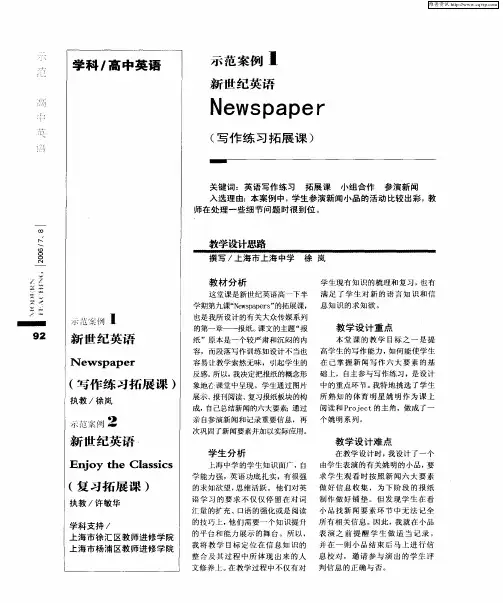
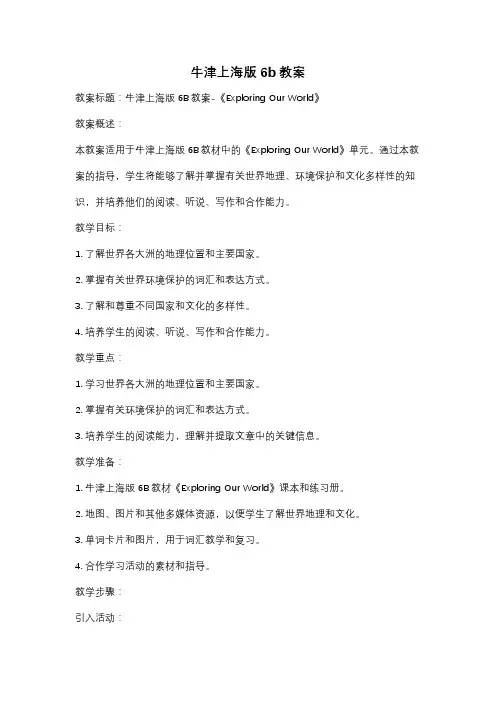
牛津上海版6b教案教案标题:牛津上海版6B教案-《Exploring Our World》教案概述:本教案适用于牛津上海版6B教材中的《Exploring Our World》单元。
通过本教案的指导,学生将能够了解并掌握有关世界地理、环境保护和文化多样性的知识,并培养他们的阅读、听说、写作和合作能力。
教学目标:1. 了解世界各大洲的地理位置和主要国家。
2. 掌握有关世界环境保护的词汇和表达方式。
3. 了解和尊重不同国家和文化的多样性。
4. 培养学生的阅读、听说、写作和合作能力。
教学重点:1. 学习世界各大洲的地理位置和主要国家。
2. 掌握有关环境保护的词汇和表达方式。
3. 培养学生的阅读能力,理解并提取文章中的关键信息。
教学准备:1. 牛津上海版6B教材《Exploring Our World》课本和练习册。
2. 地图、图片和其他多媒体资源,以便学生了解世界地理和文化。
3. 单词卡片和图片,用于词汇教学和复习。
4. 合作学习活动的素材和指导。
教学步骤:引入活动:1. 利用地图和图片引入本单元的话题,激发学生对世界地理和文化的兴趣。
2. 提问学生对不同国家和文化的了解,引导他们思考文化多样性的重要性。
主体活动:3. 分组活动:将学生分成小组,每组负责研究一个大洲的地理位置和主要国家。
每个小组通过合作学习的方式,制作一张海报来展示他们的研究成果。
4. 阅读理解:学生阅读课本中关于环境保护的文章,并回答相关问题,以检验他们对文章内容的理解。
5. 词汇教学:教授与环境保护相关的词汇,并进行词汇练习,如词义匹配、填空等。
6. 合作学习活动:学生分组进行角色扮演,模拟国际环境保护会议,讨论并提出解决环境问题的方案。
7. 书面表达:学生根据所学内容,撰写一篇关于环境保护的短文,表达自己的观点和建议。
总结活动:8. 学生展示海报和短文,分享他们的研究成果和观点。
9. 教师对学生的表现进行评价,并给予积极的反馈和建议。
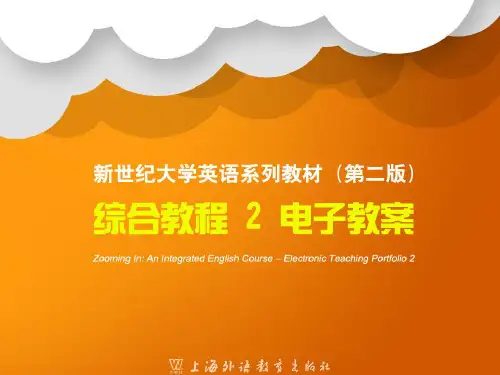
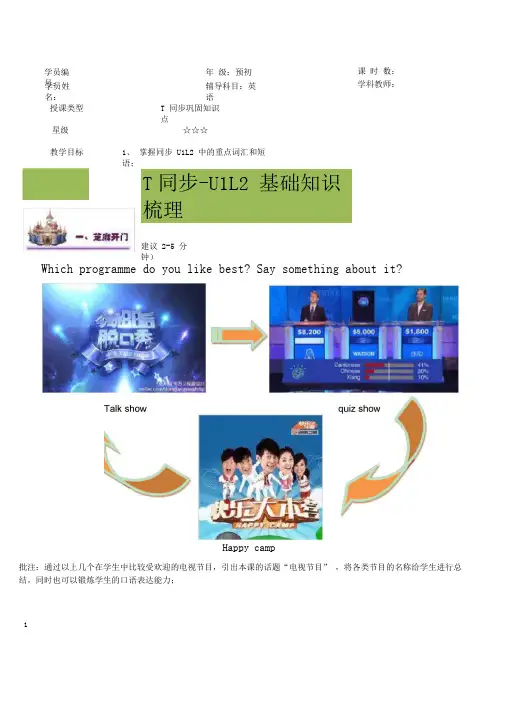
1Which programme do you like best? Say something about it?Happy camp批注:通过以上几个在学生中比较受欢迎的电视节目,引出本课的话题“电视节目” ,将各类节目的名称给学生进行总 结,同时也可以锻炼学生的口语表达能力;学员编号: 年 级:预初学员姓名:辅导科目:英语课 时 数: 学科教师:授课类型 T 同步巩固知识点星级 ☆☆☆教学目标1、 掌握同步 U1L2 中的重点词汇和短语;T 同步-U1L2 基础知识梳理建议 2-5 分钟)2一、词汇 Words1. programme n. 节目,节目单 ( 也作 : program ) 辨析 : performance programmeperformance 是 “表演,表现 ”,常指舞台上 的演出。
programme 主要是指电台或电视节目或电脑程序等。
e. g. ) I like to watch TV programmes after supper. 我喜欢晚饭后看电视节目。
We put on English performances at the English Evening. 我们在英语晚会上表演了英语节目。
批注:两个词的词形很像,因此容易搞混,要注意含义区分,同时 TV programmes 在选择题目中常考,一般以复数 为主;e. g. This is a special day in the history of our country. 今天是我国历史上一个特殊的日子。
The mushroom is a speciality here. 蘑菇是这里的特色菜。
I made this specially for your birthday. 这是我特意为你生日而作的。
批注:注意 special 的几个词形变换,在词转题目中还是很常考的,尤其是 specialist 4. stay vi. & n. 逗留,暂住 (过去式; stayed 现在分词: staying ) e. g. He was staying at theRitz(Hotel).她住在里兹旅馆3. special a. 特别的,特殊的,专门的 派生词 : specially ad . 特别地,专门地speciality n. 特长,专长,特色菜specialist n. 专家quiz kid 极聪明的孩子 批注: [ 复 ]quizzes 需要注意一下是加 -es ;建议 20-25 分钟)2. quiz n. 测验,考查习惯用语 :have a quiz (进行)小测验 quiz show (电视, 电台的 )智力竞赛节目quizmaster (答问比赛节目中的)提问者习惯用语 : stay in 呆在家里 = stay at home— stay home保持stay here/there 呆在这、那stay+adj.stay up 不睡,熬夜stay behind 留下来34send ⋯ for 派人去拿,派人去请send sb. sth. = send sth. to sb. 寄某物给某人e. g. He send me a card( = He sent a card to me). 他寄给我一张卡。
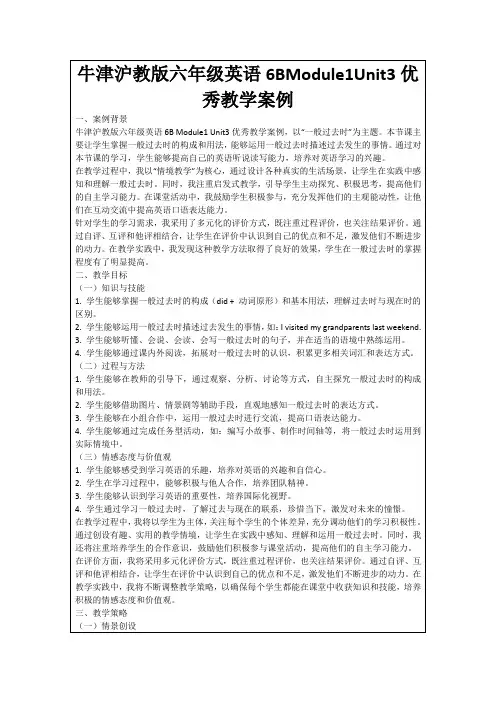
Unit6 The Environment教案一、单元分析(Unit Analysis)(一)单元地位(Unit Position)1.本单元主要介绍了人类活动对海洋造成的影响。
通过本单元的学习,学生能够了解海洋生态环境的现状以及面临的问题和危机,认识到人类活动对环境造成的破坏。
从而注重环保意识的培养,爱护我们生存的地球,并付诸于行动,劝阻制止环境污染的行为。
2.本课继续学习动词不定式结构,重点为动词不定式的被动结构,对于这一语法现象,教师有必要在课堂教学中加以一定的句型操练。
可多设计一些句型转换练习。
3.在学习技巧中,意群的介绍为学生提供更有效的阅读方法。
(二)单元目标(Unit Target)1.了解不定式被动结构的含义与用法,并能熟练运用到句型结构中。
2.能描述人类活动对环境产生的影响及此过程中环境发生的变化。
3.能就环保话题发表自己的见解。
4.了解识别意群,改善阅读习惯。
(三)单元重点(Unit Points)1.关键词:◆语言知识类n. threat, species, cycle, pollution, limitv. circulate, affect, destroy, disturb, recoveradj./adv. eventually, rare, long-term, vastexpressions: under threat, have effects on, as a result, food chain,set limits for, pile up, agree on, in the future, large numbers of,a great deal, all over the world, cause sb to do, for fun◆交际功能类1)有关海洋:ocean, wave, seawater, marine creature, tropical island, coast, coastal city/area, port, coral reef, shellfish, continental shelf…2)环境破坏:industry, dump, overfishing, acid rain, greenhouse effect, sandstorm, destroy, pollution, pollutan t, wastes, chemicals, soil erosion, poison, extinct …3) 环境保护:take care of plants, love animals, preserve wildlife, recycle used things,reduce wastes, collect dead batteries, say “No” to disposable chopsticks…2.功能:Talking about the pollution and protection of environment(描述“环境污染和环境保护”)●… can have harmful effects on …●… are the most common problems.●One of the biggest threats to … is pollution from…●… be reported to have long been polluted by …●… disturb the natural cycles of …●What we do in one part of the ocean/area can affect another.●… is under threat now.●… is to be done to prevent pollution.3 语法点:本课以不定式的被动结构为重点,在学习过程中,可多进行句子合并,句型操练和主动、被动句式的转换。
沪教牛津版初中英语写作课教案教案标题:沪教牛津版初中英语写作课教案教案目标:1. 帮助学生掌握初中英语写作的基本技巧和方法。
2. 培养学生的写作能力,提高他们的语言表达和思维能力。
3. 培养学生的创造力和想象力,使他们能够用英语进行自由流畅的表达。
教材准备:1. 沪教牛津版初中英语教材(包括学生用书和教师用书)。
2. 录音机和磁带/CD,用于听力练习和模仿。
3. 板书或投影仪,用于展示教案的重点和范例。
教学步骤:引入(5分钟):1. 引导学生思考写作的重要性和目的。
2. 提问学生关于写作的经验和困难。
讲解写作技巧(15分钟):1. 介绍写作的基本要素,如主题句、支持句和结论句。
2. 解释如何使用适当的词汇和语法来表达自己的意思。
3. 提供范例句子和段落,让学生理解和模仿。
练习写作(20分钟):1. 给学生一个写作题目或主题,如"My Favorite Hobby"(我最喜欢的爱好)。
2. 让学生在规定的时间内写一篇短文,包括主题句、支持句和结论句。
3. 鼓励学生使用课堂上学到的词汇和句型。
分享和讨论(10分钟):1. 学生交换他们的作品,并互相阅读和评价。
2. 教师引导学生讨论他们的写作经验和感受。
3. 教师提供反馈和建议,帮助学生改进写作技巧。
巩固练习(10分钟):1. 提供更多的写作练习题目,让学生继续练习和巩固所学的写作技巧。
2. 鼓励学生在家里继续写作,并分享他们的作品。
总结(5分钟):1. 总结本节课学到的写作技巧和方法。
2. 强调写作的重要性和持续练习的必要性。
3. 鼓励学生在日常生活中多写多练,提高他们的写作能力。
扩展活动(可选):1. 组织写作比赛或展览,让学生展示他们的写作成果。
2. 邀请一位专业作家或英语教师来给学生讲解写作技巧和经验。
教案评估:1. 观察学生在课堂上的参与和表现。
2. 收集学生的写作作品,评估他们的语言表达和写作能力的提高程度。
3. 与学生进行个别评价和反馈,帮助他们改进和发展写作技巧。
课程名称:新世纪大学英语写作课程目标:1. 培养学生的英语写作能力,包括文章结构、语法、词汇和逻辑思维。
2. 提高学生的英语写作兴趣,激发学生自主学习和创作的积极性。
3. 培养学生的批判性思维和创造性思维,使其能够撰写具有个人特色的文章。
课时安排: 10课时教学内容:第一课时:写作基础与技巧1. 教学目标:- 了解英语写作的基本结构,包括引言、正文和结论。
- 掌握常用的写作技巧,如过渡词的使用、论点的支撑等。
2. 教学内容:- 介绍英语写作的基本结构,通过实例展示如何组织文章。
- 讲解过渡词的作用,以及如何在文章中使用过渡词。
- 分析优秀文章的写作技巧,引导学生模仿学习。
3. 教学活动:- 讲座:教师讲解写作基础和技巧。
- 案例分析:学生分析优秀文章,找出其中的写作技巧。
- 练习:学生根据所学知识,撰写短文。
第二课时:语法与词汇1. 教学目标:- 提高学生的英语语法水平,使其能够正确运用语法知识进行写作。
- 扩大学生的词汇量,提高词汇运用能力。
2. 教学内容:- 讲解常见的语法错误及其纠正方法。
- 介绍常用词汇及其用法,并进行词汇练习。
3. 教学活动:- 讲座:教师讲解语法和词汇知识。
- 语法练习:学生完成语法练习题。
- 词汇练习:学生完成词汇练习题。
第三课时:写作实践1. 教学目标:- 培养学生的写作实践能力,使其能够根据不同题材和文体进行写作。
2. 教学内容:- 分析不同题材和文体的写作特点。
- 学生根据所学知识,撰写不同题材和文体的文章。
3. 教学活动:- 讲座:教师讲解不同题材和文体的写作特点。
- 写作练习:学生根据所学知识,撰写不同题材和文体的文章。
第四课时:写作修改与润色1. 教学目标:- 培养学生的修改和润色能力,使其能够对文章进行自我完善。
2. 教学内容:- 介绍修改和润色的方法,如检查语法错误、调整句子结构等。
- 学生根据所学知识,修改和润色自己的文章。
3. 教学活动:- 讲座:教师讲解修改和润色的方法。
New Century English 6BUnit Two Traffic and Traffic RulesLesson 2 Means of TransportMeans of Transport【教材分析】本课写作主题是交通工具。
要求学生写6-7句话介绍日常生活中使用的交通工具,并对不同交通方式进行比较。
【学情分析】学生非常熟悉交通工具这一话题。
在对不同交通方式进行比较时会涉及到形容词比较级的用法,预备班学生对此不是很熟练,因此是本写作任务中的难点。
【教学目标】By the end of the activities, the students are expected●to be able to change the dialogue into a narrative paragraph.●to use the proper forms of adjectives to compare different means of transport.●to describe suitable means of transport for a trip.【教学活动设计】Activity 1BrainstormingWhat means of transport do you know?设计说明:此活动的目的是激活学生背景知识,呈现交通工具的有关词汇,通过朗读、图片文字配对练习来扫清写句任务中的词汇障碍。
Activity 2Ask and answer1. What means of transport do you often use?2. How do you usually go to school?3. Why do you like to go to school by bus/bike/on foot……?4. Which is more expensive, traveling by light rail or by taxi?5. Which do you like better, traveling by air or by train? Why?设计说明:通过问答,使学生能初步谈论日常生活中使用的交通工具,并初步能使用形容词的比较级形式对交通工具作比较和评论。
Activity 3Pair workMake dialogues after the model.Model:John: Where shall we go for the summer holiday?Betty: Shall we go to Beijing? There are many interesting places there.John: But I think it’s too far from here. I’d like to go to Nanjing. It’s nearer, and there are also many interesting places there.Betty: But how shall we go there?John: I think we can go by train. It’s safer.Betty: I’ d like to travel by plane. It’s faster and more comfortable.John: But that’s more expensive.Betty: Well then, shall we go by coach? It’s both cheaper and safer, and it’s very convenient. We can enjoy the view on the way.John: That’s a good idea.Word box:convenient, comfortable, expensive, cheap, interesting, beautiful, fast, slow, safe, enjoy the view on the way设计说明:通过机械模仿和替换操练情景对话,掌握谈论交通工具的基本句型和使用形容词比较级来描述不同交通工具的性能。
Activity 4 Group workWork in groups of four to change the above dialogue into a narrative paragraph.Fill in the blanks with the information from the dialogue.are talking about their summer holiday plan. Betty to go to Beijing, but John wants to go to Nanjing because it’s and there are also many interesting places there. John wants to go there by because . Betty thinks it’s faster and more comfortable to go by . However, John thinks it’s . Finally they decide to go to Nanjing by because it’s and it’s . They can enjoy the view on the way as well.设计说明:此项活动通过填空形式降低难度,帮助学生将对话改写成陈述性的语段;教师可视学生基础增加或减少填空的格数,内容重点为交通方式和形容词的比较级。
可先进行小组讨论,然后汇总并口头朗读操练。
人称改变和动词形式的变化是难点。
Activity 5Writing practiceWrite a short paragraph(six or seven sentences)introducing your choice of means of transport when going on a holiday trip.During the summer holiday I’m going to take a trip to …设计说明:此活动要求学生当堂写6—7句话,描述自己外出旅行时交通方式的选择并说明理由;进一步巩固表达交通方式的句型和形容词比较级的正确使用。
写完后教师利用投影仪作集体讲评和修改,对典型错句作分析,并进行跟进性训练。
【作业布置】Write a short paragraph(six or seven sentences)introducing your father’s (or your friend’s) means of transport when going on a trip.设计说明:此写作任务可作为课外作业,要求学生用第三人称描述外出旅行时对交通方式的选择,并使用比较级表达不同交通方式的特点。
人称改变后动词形式的变化应是难点,教师在批改后应作集体讲评。
【学生作文及点评】作文1I have a plan for the summer holidays. I’ll go to Hainan. I’ll go there with my parents and my best friend Jane. I think Hainan is beautiful. I think coach is cheap and comfortable. The plane is faster than bus and train. But the plane is more expensive than bus and train. It’s also comfortable. The train is cheaper than the plane, but the coach is the cheapest of the three. I’ll go to Hainan by train. I will stay there for two weeks. I’m looking forward to it.作文2The summer holiday is coming. I will go to Yunnan for mu summer holiday. I will go there with my parents and brother. We will go there by train, it’s more comfortable than bus. It’s also cheaper than plane. Yunnan is very beautiful, so when we go there, we can enjoy the view on the way in the train. The trip will last two weeks.点评内容:两篇作文都对暑假旅游的目的地、人物和交通方式作了描述,并对所选择的交通方式作了分析对比。
第二篇例文选择坐火车旅行的三个理由较充分,前后内容连贯。
而第一篇例文虽然就多种交通方式进行了比较,但与最后选择坐火车没有关联性,理由不充分。
语言:两篇作文的语言总体较好。
第一篇使用了宾语从句,形容词比较级的使用正确。
不足之处是冠词的使用不规范。
第二篇例文的语言更流畅,比较级使用得当,还使用了when引导的状语从句, 但有拼写错误,my写成了mu。
结构:两篇作文的开头和结尾都很简明扼要。
第二篇作文的内容连贯、逻辑性强。
第一篇作文的前后内容不够连贯,阐述的理由不充分。